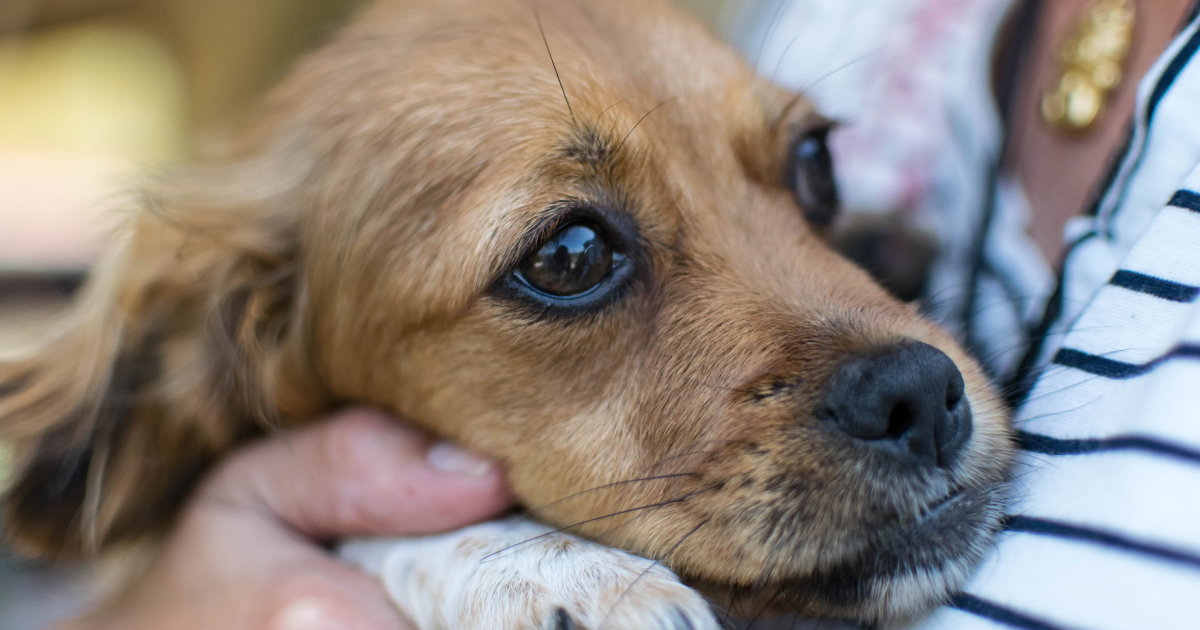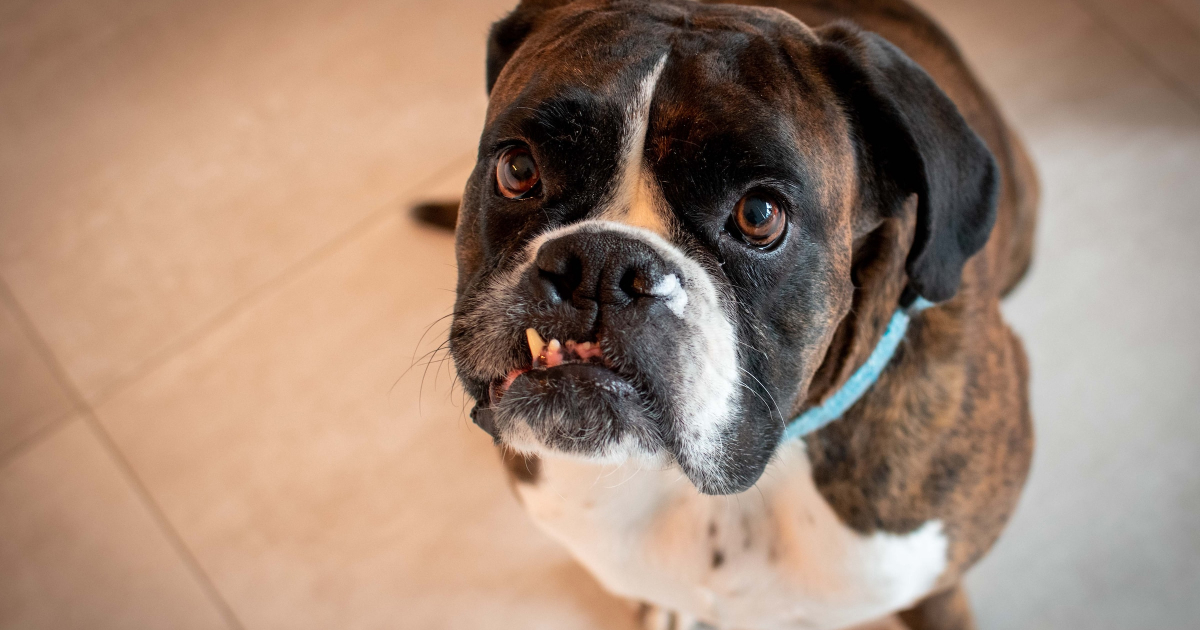As a pet parent, pneumonia in dogs can be scary—so we’re sharing what you need to know about the causes and symptoms of dog pneumonia and treatments for it here.

Pneumonia in Dogs: Causes, Symptoms, and Treatments
Pneumonia can cause your dog great distress, and watching your dog struggle to breathe as their condition worsens can also be frightening for you.
Many types of pneumonia can develop in dogs, and various risk factors can increase their chances of getting it. The good news is that your veterinarian can successfully treat your dog for pneumonia in most cases. A positive outcome is highly likely if you take action to get your dog help quickly.
What is Pneumonia in Dogs?
Just like humans, dogs can suffer from pneumonia. This debilitating respiratory condition causes inflammation and fluid buildup in the lungs, making it exceedingly difficult for a dog to breathe. As a result of their breathing problems, dogs with pneumonia will often experience oxygen deficiencies, which is a complication that may require emergency medical intervention.
Fortunately, dogs with pneumonia can and usually will recover. But you should know that if you ignore the symptoms of pneumonia in your dog, you could jeopardize their life.
Types of Dog Pneumonia

There are several types of pneumonia that dogs can develop (with three types being primary), all of which are serious, but all of which are amenable to treatment.
Viral pneumonia in dogs
Infectious pneumonia caused by viruses or bacteria (or both) is the most common type of dog pneumonia. Viral agents can infect a dog’s lungs if the animal shares the same air space with another infected dog (viral pneumonia is highly infectious). In general, pneumonia is more likely to develop if the dog’s health has already been compromised in some way. Fluid accumulation in the air sacs of one or both lungs will accompany viral pneumonia. This effect interferes with breathing and the efficient exchange of oxygen and carbon dioxide in the bloodstream.
Viral pneumonia is detectable by the immense breathing difficulties and fatigue it will cause, which will only worsen if medical attention is not provided rapidly after the onset of the initial symptoms. Treatment includes medications that can help clear out congested air passageways and anti-inflammatory drugs that can reduce pain and high fever.
While any dog could get viral pneumonia, the risk is especially high for those exposed to other dogs for an extended period. Dogs staying in shelters or being kept in long-term boarding facilities face an elevated risk, as do dogs that frequent dog parks or spend their days in doggie daycare.
Bacterial pneumonia in dogs
Like viral pneumonia, bacterial pneumonia is an infectious disorder that can be passed from one dog to another. Many different kinds of bacteria can infect a dog’s lungs, leading to an unhealthy buildup of fluid that makes breathing more and more difficult as the condition progresses.
The type of bacteria most likely to cause pneumonia in dogs is Bordetella bronchiseptica. This bacteria can be easily transmitted between puppies, older dogs and dogs with compromised immune systems. The risks for bacterial pneumonia are elevated when these animals are around many other dogs and if other viral or bacterial infections have already developed (bacterial pneumonia can be a primary or secondary condition).
Bacterial pneumonia is identifiable by a dog’s breathing problems and a general lack of wellness. Antibiotics can help a dog overcome bacterial infections, and they are beneficial if the type of bacteria involved has been identified and the antibiotic prescribed has a proven capacity to combat it.
Aspirational pneumonia in dogs
When a dog breathes in food, vomit or medication, this can block air circulation and create inflammation in the lungs, possibly leading to aspirational pneumonia. A dog can also be at risk for aspirational pneumonia if they have a neuromuscular disorder that affects breathing or if its lower esophagus is enlarged because of frequent regurgitation caused by acid reflux.
Aspirational pneumonia is common in dogs. Breeds of dogs with flattened noses (i.e., Bulldogs, Boston Terriers, Pugs, etc.) can be especially vulnerable since they can have pre-existing breathing issues. This type of pneumonia causes coughing and escalatedbreathing problems. It will also leave a dog tired and without their normal energy level.
Aspirational pneumonia treatment involves administering medications that can clear fluid from blocked airways and anti-inflammatories that can reduce pain and suppress fever. If the case is severe, hospitalization may be necessary to provide antibiotics, oxygen and IV fluid therapy.
Other types of dog pneumonia
Viral, bacterial and aspirational pneumonia are the most diagnosed types. However, other varieties of dog pneumonia occur less frequently yet can still be diagnosed by veterinarians. These include:
- Fungal pneumonia. Dogs can get this from inhaling fungi or spores from contaminated plants or soil.
- Parasitic pneumonia. Dogs may pick up parasites from animal feces or insect bites. In some instances, those parasites can reside and reproduce inside the lungs.
- Inhalation pneumonia. A dog may develop pneumonia from inhaling toxic fumes or smoke that contains poisons or irritating chemicals.
- Allergic pneumonia. Respiratory tract irritants like pollen and spores can trigger an immune system response in dogs, ultimately leading to pneumonia.
What You Need to Know About Dog Pneumonia
As a loving and concerned pet parent, you need to know all the facts about how your dog might contract pneumonia, its impact on their health and welfare, and how you can help your dog overcome it rapidly should it be diagnosed.

Causes of Pneumonia in Dogs
In most cases, the initiating factor for dog pneumonia is when an animal inhales or consumes something unhealthy for the body and the respiratory tract in particular. This list of potential causes of pneumonia in dogs includes viruses, bacteria, fungi, allergens, parasites, chemical contaminants, dog vomit, and infected animals’ feces.
Exposure to these hazards will not automatically cause a dog to develop pneumonia. But some dogs have a much greater likelihood of developing pneumonia than others.
Some of the most common risk factors for dog pneumonia include the following:
- Young or old age
- Having a history of respiratory issues
- Being in poor health generally
- Living in an unclean environment
- Sharing small quarters with other dogs for an extended period
- Suffering from conditions that cause difficulty swallowing (laryngeal paralysis, enlarged esophagus, cleft palate, etc.)
- Immune system disorders or being on medications with immunosuppressive effects
- Metabolic disorders (kidney failure, diabetes, Cushing’s disease, Addison’s disease)
- Chronic vomiting
- Being anesthetized or sedated for surgery
- Having respiratory allergies
- Belonging to a brachycephalic breed (dogs with flattened noses, like bulldogs, pugs, Boston terriers, Pekingese, etc.)
Preventing Pneumonia in Dogs
One of the most critical steps to counteracting the threat of dog pneumonia is to stay up-to-date on your dog’s vaccinations. You’ll want to ensure those vaccinations protect against Bordetella, the bacteria that most frequently causes dog pneumonia. Vaccinations against parainfluenza and adenovirus type 2 are other shots that can help your dog avoid this condition.
Your dog’s chances of getting pneumonia will be reduced if you ensure they get plenty of exercise, eat nutritious foods, and are taken to the vet for regular checkups. Your dog’s overall health is your responsibility, and if you are proactive in this area, your dog will be more resistant to all types of health problems.
You should remember that infectious pneumonia is the most frequently diagnosed condition. Consequently, if your dog must be kept in a boarding facility or another environment they will be sharing with other dogs, you should ensure those places are run by professionals who follow the best sanitary practices.
You may be unable to protect your dog from every potential cause of pneumonia. But by taking steps to keep them healthy, active, vital and strong, you can help give them a much better chance of avoiding this malady or recovering from it quickly and completely should they develop it.
Symptoms of Pneumonia in Dogs
Pneumonia is not a subtle illness. Its impact on your dog’s health will be significant and noticeable.

The telltale symptoms of dog pneumonia include:
- Labored and loud breathing
- Chronic coughing
- High fever
- Runny nose
- Inability or unwillingness to exercise
- Nasal whistling
- Dehydration
- Lethargy and fatigue
- Loss of appetite
- Trouble swallowing
- Frequent regurgitation or vomiting
- A bluish tint to the skin
If your dog develops pneumonia, you can expect to observe several, if not most, of these symptoms. You should treat the onset of such symptoms as a medical emergency, meaning you should take your dog to see your veterinarian right away.
Diagnosing Pneumonia in Dogs
Veterinarians rely on an array of diagnostic tools to uncover the presence of pneumonia in dogs. They may start simply with a stethoscope examination to confirm the presence of excessive fluid in the lungs. Chest X-rays can uncover the severity of pneumonia, while blood tests can help reveal some complications that might already be occurring if this condition has truly developed.
To gain a deeper understanding of the progress of a case of dog pneumonia, veterinarians often use high-tech methodologies that reveal valuable information and can help guide treatment choices. Some possibilities include pulse oximetry, which uses infrared light to measure oxygen levels in the capillaries, and blood-gas analysis, which can measure the exact oxygen-to-carbon dioxide ratio in the bloodstream. Another potential option is bronchoscopy, a technique that can detect and identify specific bacterial pathogens in fluid samples.
Thanks to the rapid pace of technological advances in veterinary medicine, veterinarians can now diagnose pneumonia accurately in virtually every instance.
Treatments for Pneumonia in Dogs

Mild cases of dog pneumonia can be treated on an outpatient basis with appropriate medications and plenty of rest in a non-stimulating environment. However, hospitalization or clinical care will be necessary when pneumonia is more serious to help your dog overcome this persistent and disabling condition.
Bacterial pneumonia can be treated with antibiotics, either of a broad-spectrum type or something more specific if the exact bacterial invader has been identified. Oxygen therapy may be needed to help your dog restore healthy oxygen levels. This can best be provided through immersion in an oxygen-enhanced environment. Pneumonia frequently causes dehydration, which can be treated with IV fluid therapy. If the condition is severe, your dog could be put on a ventilator, but that will only happen if their breathing is significantly compromised.
Depending on your dog’s recovery rate, they could spend anywhere from one week to a month in a supervised clinical setting before being sent back home to continue their recovery.
Home remedies for dog pneumonia
When caring for a dog with pneumonia at home, you can help them eliminate the fluid in their lungs and overcome their breathing issues in several ways.
One is to have them exercise in short stints a few times each day, which will loosen the secretions trapped in their lower respiratory system and help them cough up excess mucous. A second way to help is to place them in a bathroom with the door closed, and the shower turned on to a hot setting every few hours. The steam from the shower will clear out their lungs more rapidly and efficiently than breathing regular air.
When to see a vet for pneumonia in dogs
There is no such thing as being too cautious with your dog’s health. When your dog is coughing persistently or experiencing a constant runny nose, this is an early sign that pneumonia may have developed and should be enough to convince you to contact your vet. Lethargy is another indication that your dog is suffering from something that requires the attention of a medical professional.
Dog Pneumonia FAQs
Here’s a brief rundown of some of the questions veterinarians often hear from pet parents worried about the risk of dog pneumonia:

Can a dog recover from pneumonia?
In most instances, prompt treatment will make all the difference. For young or old animals, or those with immunodeficiency diseases or other chronic health disorders, the speed and thoroughness of treatment will determine whether the chances of recovery are good, uncertain or poor. If risk factors make a dog vulnerable, treating or otherwise eliminating those risk factors will be necessary to ensure pneumonia isn’t experienced recurrently.
What causes a dog to get pneumonia?
Infectious microbes like bacteria and viruses are the primary cause of pneumonia in vulnerable dogs (and sometimes even in less vulnerable dogs). These are more likely to be passed from dog to dog in crowded and unclean environments. Pneumonia can also be an unfortunate consequence of pre-existing health conditions, especially those that affect swallowing or breathing.
Is dog pneumonia contagious?
Infectious pneumonia involving bacterial or viral invaders is the most common type of pneumonia. This can be highly contagious if your dog comes into contact with an animal carrying a hazardous microbe. Parasitic sources of pneumonia can also be passed from animal to animal, particularly if they share a crowded space. Other types of the condition, including aspirational, fungal, inhalation or allergic pneumonia, occur because of a dog’s individual experiences and are not contagious.
How do you know if a dog has pneumonia?
One of the most apparent indications is if they have a persistent cough, and another is if their nose is constantly running. Labored breathing would indicate the condition is progressing. If a dog’s skin begins to take on a bluish tint, it could indicate a severe lack of oxygen that requires emergency treatment.
How do you comfort a dog with pneumonia?
Dogs with pneumonia need a quiet, relaxing environment and lots of love and attention. They should be kept warm and dry at all times, and exercise levels should be adjusted if they show signs of fatigue from moving around too much. If your dog is being treated at home on an outpatient basis, you should follow your veterinarian’s instructions to the letter and contact your vet immediately if you see any signs of their condition worsening.
Keep Your Dog Healthy Year-Round

Your dog will be far more likely to avoid bouts of pneumonia and other diseases and disorders if they live a healthy lifestyle. Dogs need prodigious amounts of sunshine, fresh air, exercise and nutritious food to remain vigorous and resilient and to protect against severe conditions like pneumonia.
One of the best ways to keep your dog pneumonia-free and on the path to excellent health is to provide regular servings of PetPlate’s delicious, nutrient-packed entrees and organic treats. Along with our health-preserving supplements, our daily meals and special treats can form the core of a wellness package that helps your dog stay strong and vital and keeps your dog’s immune system in tune and operating at total efficiency.

